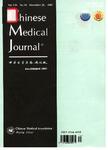Effect of universal salt iodization on antithyroid drugs
Effect of universal salt iodization on antithyroid drugs作者机构:Department of Endocrinology Peking Union Medical College Hospital Chinese Academy of Medical Sciences Peking Union Medical College Beijing 100730 China National Iodide-Deficiency Reference Laboratory of China Beijing102206 China
出 版 物:《Chinese Medical Journal》 (中华医学杂志(英文版))
年 卷 期:2006年第119卷第13期
页 面:1108-1112页
核心收录:
学科分类:1007[医学-药学(可授医学、理学学位)] 10[医学]
主 题:iodine deficiency disease universal salt iodization antithyroid drugs
摘 要:Iodine deficiency disease (IDD) is common in China. An universal salt iodization (USl) program has been implemented by the Chinese government since 1996. As a result, the goiter rate in 8- to 10-year old children decreased from 20.4% in 1995 to 5.8% in 2002.1 But the adverse effects of iodine excess such as iodine-induced hyperthyroidism, iodine-induced goiters, iodine-induced hypothyroidism, etc. have become a great concern to healthcare professionals as well as the general population. The impact of USI on antithyroid drugs (ATDs) might become a potential challenge to address. With a special grant from the Department of Disease Control, the Health Ministry of China, we conducted a prospective study on the effects of USI on ATDs at the thyroid section of the Endocrinology Clinic of Peking Union Medical College Hospital (PUMCH), Beijing.



